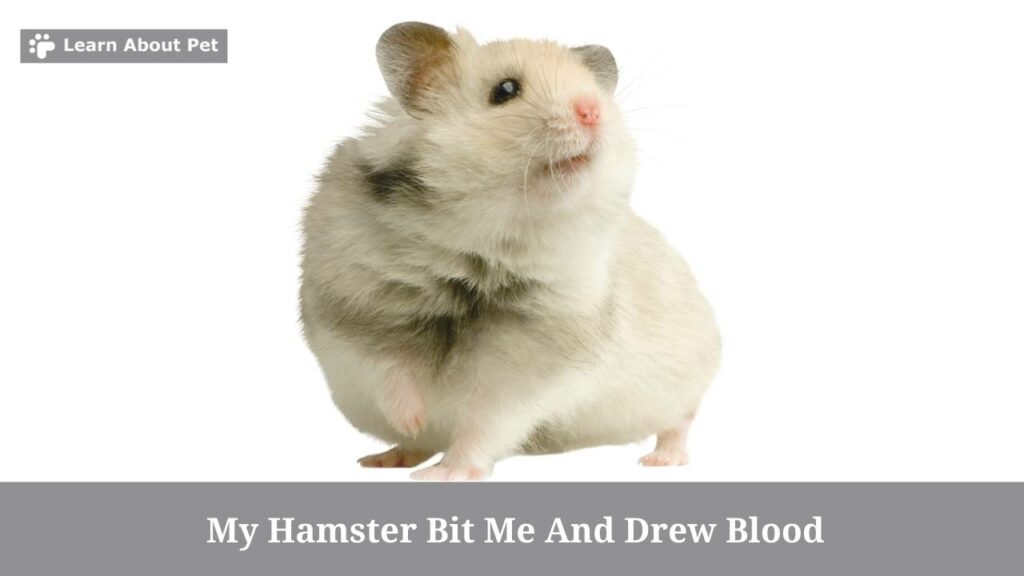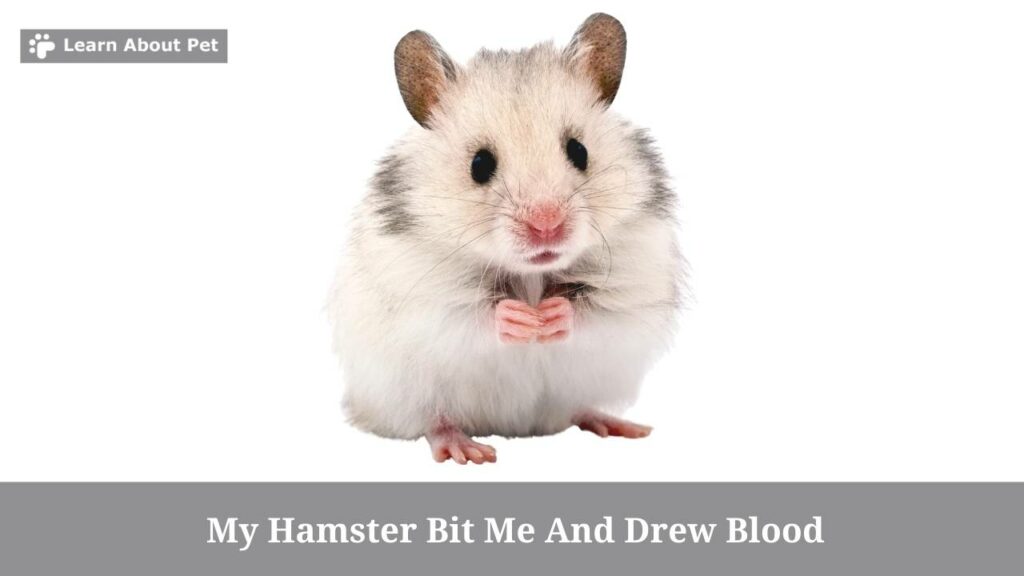There are several concerns that you are likely to have, in a situation where your hamster bit you and drew blood. You will want to know whether it is serious, what is likely to happen next, what you need to do about it and how you can prevent it from recurring. This article answers all those questions.
If my hamster bit me and drew blood, I would first focus on stopping the bleeding and cleansing the wound. Going forward, I would work on finding better ways to handle the hamster, to minimize chances of being bitten again.
If the hamster bite drew blood, it is highly likely that the hamster was either very agitated or very fearful. Most ‘routine’ hamster bites don’t draw blood.
It is natural for you to have questions like, why did my hamster bit me so badly? Which hamster bite warning signs did I miss.

Such questions are understandable, if a hamster bite draws blood.
Are Hamster Bites Serious?
Whenever there is a discussion on the subject of hamster bites, there are certain questions that are guaranteed to come up.
Key among those is the one on whether hamster bites are serious.
Alongside it comes questions like, is it OK to get bitten by a hamster? Can a hamster bite get infected?
There are even those who will go as far as asking, can you die from a hamster bite?
The true position is that hamster bites are usually not very serious.
Many people who keep pet hamsters get bitten from time to time. And besides the pain and minor blood loss, there are usually no major complications.
The only situation in which a hamster bite is dangerous is if the hamster happens to be suffering from certain illnesses. So there are illnesses that hamsters may spread to humans through bites.
If a hamster bites me, that would be my biggest worry.
If you research on what are the risks behind a hamster bite, you notice that this one (of contracting a disease) is the major one.
A situation in which my hamster bit me and I drew blood would imply a higher chance of disease transmission.
Usually, hamster bites don’t draw blood. They don’t even break the skin. In such cases, chances of disease transmission are low.
But if my hamster bit me and I am bleeding, disease transmission chances are much higher…
This leads to another question: would you need a tetanus injection for a hamster bite? And the answer seems to depend on who you ask. Some say it is necessary, while others say it is unnecessary.
Certainly, if it is a wild hamster that bit you, that sort of injection would be required urgently.
My Hamster Bit Me And Drew Blood – What Is Likely To Happen?
As noted earlier, a situation in which a hamster bites you hard enough to draw blood can be quite distressing.
You will certainly want to know what happens if a hamster bites you and it bleeds.
Firstly, you are bound to experience some pain, if you were bit by hamster hard enough to draw blood. Thankfully though, this pain tends to subside after a while.
Secondly, there may obviously be some blood loss, if you were bit by a hamster hard enough to break skin. Do hamster bites bleed a lot? Normally, the blood loss is minimal.
But if the bite happened to land on a vessel’s path, then it can be quite serious bleeding. So you may find that the hamster bite won’t stop bleeding on that account.
Thirdly, there are scenarios in which the hamster bite area may develop an infection. This may be an infection from a pathogen that the hamster was harboring.
Or it may be an infection from opportunistic pathogens, which just take advantage of the skin breakage.
My Hamster Bit Me And Drew Blood – What Should I Do?
Upon realizing that your hamster bit you hard enough to draw blood, you will naturally start thinking of the best course of action.
So the underlying question here would be, if my hamster bites me what should I do?
In this case, focus is specifically on what to do if a hamster bites you and it bleeds.
A case in which the hamster bite didn’t break skin is different. What to do if a hamster bites you but doesn’t break skin is usually simply to wash the area.
But this is a different case: in which the hamster bite draws blood. So you keep wondering, what should I do if my hamster bites me and drew blood?

Here, the first course of action is to stop the bleeding. That is if it hasn’t stopped by itself. Dabbing the area with gauze may help in that regard.
If you research on the question of what do I do if my hamster bites me and draws blood, you will see that stopping bleeding is the first priority.
With regard to what to do if your hamster bites you hard enough to draw blood, the next step is to cleanse the area.
If my hamster bit me and it started bleeding, it would mean that the hamster actually broke skin.
Thus you need to know that you are dealing with broken skin – which is prone to infection. That is the key point to keep in mind, while working out what to do if your hamster bites you and draws blood.
Using Neosporin (if available) can help in relieving pain, and minimizing chances for infection. If you read up on what to do if hamster bites you, you see that most resources recommend Neosporin cleansing.
Should I Go To Hospital If Hamster Bites And Draws Blood?
Most people seem to be of the view that ‘routine’ hamster bites don’t really warrant hospital visits.
However, if the hamster that bit you was wild (rather than a pet), then it may be harboring nasty diseases. So that warrants a hospital visit.
If the hamster bit you in an area where there is a major vessel, there may be major bleeding. This too may warrant a hospital visit.
Another weird situation in which a hamster bit me then died would surely warrant an urgent hospital visit too.
Even if you opt not to go to hospital straightaway, you should still monitor the bitten area closely. If, for instance, it starts swelling or producing pus, you would know that it may be developing infection.
Certainly, if my hamster bite me and I see such signs, I would organize an urgent hospital visit.
Why Did My Hamster Bite Me?
A situation in which a hamster bites hard enough to draw blood warrants introspection later.
The key question would be, why did my hamster bite me and drew blood?
Now with regard to why hamster bites hard enough to draw blood, the reason is usually fear and agitation.
If you handle the hamster such that it perceives you as a major threat, it may bite. And the bite may be bad enough to draw blood.
In other cases, you may find that the hamster doesn’t want to be handled. It wants to be left alone. Yet you insist on handling it. And that causes it to bite you, in agitation.
Thus when reflecting on why my hamster bit me, these are the possibilities I would think of.
Another possibility, when thinking of why my hamster bite me so hard, is that of stress. A hamster that is stressed and anxious can sometimes develop a tendency to bite.
Sometimes, the biting becomes a routine occurrence: making you start asking yourself, why does my hamster bite me incessantly.
Often, the stress and anxiety is due to being in a new environment. Thus if my new Syrian hamster bit me hard enough to draw blood, I would attribute it to factors like the stress of being in a new place.
Any situation in which my new hamster keeps biting me and drawing blood would be attributable to that.
Sometimes though, you may find that even an old dwarf hamster suddenly bites for blood due to stress and anxiety.
So factors like fear (of a perceived threat), stress, agitation and anxiety are usually responsible for major hamster bites.
If you research on what does it mean when your hamster bites you hard, most sources will point you in those directions.
How Can I Prevent My Hamster From Biting Me Again?
In the context of how to stop your hamster from biting you again, there are several effective strategies.
Firstly, you need to learn how to handle your hamster properly. Handle it in such a manner that it doesn’t perceive you as a threat.
Secondly, you need to know when the hamster doesn’t want to be handled. If you insist on handling it when it wants to be left alone, it may revolt: and bite in agitation.
Thirdly, you need to get rid of or at least minimize major stressors in the hamster’s life. As we said, a stressed hamster is more prone to biting.
Also desist from handling new hamsters until they settle down. For instance you may make your new Syrian hamster bite you if you insist on handling it before it settles.
Yet if you give it time to settle in its new home, you can go on to have more pleasant interactions in the future.
Here, one may ask, do hamsters like the taste of blood? And the answer is that a few may seem to like it, though most apparently don’t. Usually, when a hamster bites, it is because it feels forced to do so. Not because it wants to.
Final Verdict – My Hamster Bit Me And Drew Blood
If your hamster bit you and drew blood, it may be because the hamster perceived you as a threat. So it probably bit you as a defensive measure.
The hamster may also have bitten you in agitation because you handled it when it wanted to be left alone.
There is also the possibility of the hamster having bitten you simply because it was stressed or anxious.

Whatever the cause for the bite, your priority should be on stopping the bleeding. Dabbing the area with gauze can help with this.
Then you need to cleanse the wound. If you have something like Neosporin, you can apply it – to minimize infection chances and for pain relief.
Going forward, work out better ways of handing the hamster to reduce chances of it biting you badly.
As a pet lover, make sure to learn about pet more and give your pet hamster a good and comfortable life!

Welcome to Learn About Pet. My name is Rajkumar Ravichandran and I love all pets, travel, and amazing food. I write about my passion and personal experience caring for multiple pets in this blog! ❤️
Post Disclaimer
DISCLAIMER: THIS BLOG OR WEBSITE, "Learn About Pet", DOES NOT PROVIDE YOU WITH MEDICAL ADVICE AND IS NOT A SUBSTITUTE FOR MEDICAL ADVICE. ALWAYS GET IN TOUCH WITH YOUR PERSONAL VETERINARIAN AND USE INFORMATION HERE AS GENERAL ADVICE.
The information, including but not limited to, text, graphics, images and other material contained on this website are for informational purposes only. No material on this site is intended to be a substitute for professional veterinary advice, food recommendation, diagnosis, or treatment. Always seek the advice of your veterinarian or other qualified health care provider with any questions you may have regarding a medical condition or for pet food related questions.







